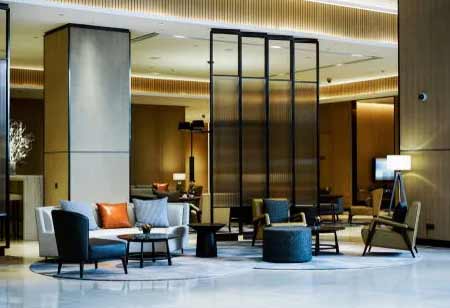Thank you for Subscribing to Hospitality Business Review Weekly Brief
Hotel Furniture That Redefines Guest Experiences

By
Hospitality Business Review | Wednesday, August 06, 2025
Stay ahead of the industry with exclusive feature stories on the top companies, expert insights and the latest news delivered straight to your inbox. Subscribe today.
The hotel furniture manufacturing industry serves as a critical foundation for the global hospitality sector, continually evolving to meet the sophisticated requirements of hoteliers and the shifting expectations of guests. This sector is not merely focused on producing functional furnishings—it is dedicated to creating environments that elevate guest experiences, embody brand identities, and align with global sustainability goals.
Design Evolution beyond Functionality to Experience
One of the most influential is biophilic design, which emphasizes integrating nature into interior spaces. This is evident in the extensive use of natural materials such as light-toned wood, stone, plant-based textiles, and furniture with organic shapes and patterns that foster a sense of connection to the outdoors, enhancing guest well-being and tranquility.
Wellness and comfort remain central to design philosophy, with furniture increasingly guided by ergonomic principles to support diverse activities, from remote work to leisure. Calming textures, muted palettes, and thoughtful acoustic properties create serene and restorative environments. Modularity and flexibility are also essential in modern hotel spaces, where adaptable, multifunctional furniture – such as storage ottomans, integrated desk-beds, and convertible sofas – optimizes space and meets evolving guest and event needs, especially in compact urban accommodations.
Localisation is becoming a cornerstone of design, reflecting a growing demand for cultural authenticity. Custom furniture pieces incorporating regional craftsmanship, materials, and motifs give guests a more immersive and memorable experience. At the same time, technology integration is increasingly seamless, with smart furniture incorporating features like USB ports, wireless charging, built-in lighting, and concealed cable management to cater to tech-savvy travelers.
Aesthetic diversity is flourishing. While minimalism continues to be favored for its clean lines and calming simplicity, curated maximalism—featuring bold colors, rich textures, and statement pieces—has found its place in hotels that wish to express a stronger personality. Regardless of style, the overarching principle remains clear: every design element must be intentional and aligned with the hotel’s overall concept and brand narrative.
Material Innovation: The Intersection of Durability and Sustainability
Material selection plays a pivotal role in contemporary hotel furniture manufacturing, carefully balancing aesthetic appeal, durability suited for high-traffic environments, and a growing commitment to environmental responsibility. Sustainability is no longer a niche consideration—it has become a standard expectation across the industry. Manufacturers are increasingly incorporating responsibly sourced and eco-friendly materials such as FSC-certified wood, which ensures timber is derived from responsibly managed forests, and reclaimed or recycled wood, which reduces waste and introduces character and history to each piece. Bamboo, valued for its rapid renewability and strength, is gaining traction alongside recycled metals and plastics, which are repurposed into sturdy frames and components.
In addition, sustainable textiles—crafted from recycled materials, organic fibres, or plant-based innovations—are being adopted, along with low-VOC finishes that employ water-based stains, paints, and adhesives to reduce harmful emissions and promote healthier indoor air quality. Beyond material choice, durability itself is a form of sustainability. By prioritizing robust construction techniques and high-performance finishes, manufacturers extend the furniture's lifespan, reducing the need for frequent replacements and minimizing resource consumption. Advanced laminates, powder coatings, and performance fabrics are commonly used to withstand the wear and tear typical of hotel environments. Where possible, manufacturers are also opting to source materials locally, a practice that helps reduce transportation-related emissions and supports regional economies.
Technology Transforming Production
Technology fundamentally transforms hotel furniture design, manufacture, and management. Computer Numerical Control (CNC) machining is at the forefront of this shift, which enables exceptional precision and consistency in cutting, shaping, and drilling complex components across various materials. This is especially critical for realizing intricate designs, ensuring seamless integration of smart features, and supporting mass customization.
Advanced software tools such as Computer-Aided Design (CAD) and Computer-Aided Manufacturing (CAM) further enhance the process. These tools allow for detailed 3D modeling, virtual prototyping, and efficient translation of designs into machine instructions. Nesting software, in particular, plays a key role in minimizing material waste by optimizing how components are cut from raw material sheets.
Automation and artificial intelligence (AI) are also reshaping production dynamics. Automation takes over repetitive tasks, boosting efficiency and enabling skilled workers to focus on more complex operations. AI is increasingly adopted to optimize workflows, perform predictive maintenance, and ensure quality.
The rise of digital integration, including smart factory concepts, brings connectivity and real-time monitoring to manufacturing processes. These connected systems enhance inventory management, streamline order-to-delivery operations, and allow the smooth incorporation of embedded technologies—such as charging ports or sensors—into furniture during production.
The hotel furniture manufacturing industry is positioned for continued growth and transformation. Ongoing advancements in design, materials, and technology will drive its future. The ability to deliver customized solutions that align with distinct hotel brand standards and evolving guest expectations will remain essential. As global travel expands and hospitality concepts evolve toward more diverse and experience-centric models, manufacturers prioritizing adaptability, quality, technological integration, and environmental responsibility will be best equipped to lead the sector forward. The industry’s focus remains on crafting furniture that is functional and aesthetically refined, enhances the guest experience, and contributes meaningfully to sustainable hospitality.







